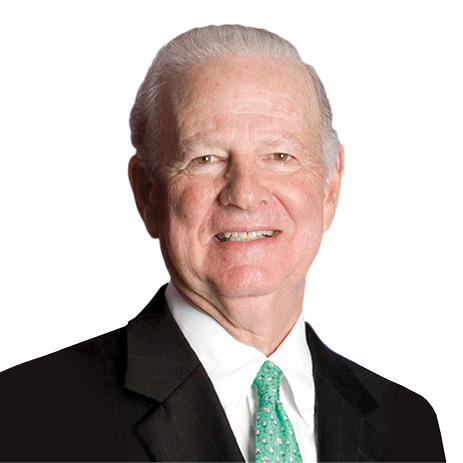A Formula for Leadership
Baylor Law hosts renowned statesman and public servant
Former U.S. Secretary of State James A. Baker III, whose 30-year legacy of public service includes senior positions under three U.S. presidents, was the virtual keynote speaker for the 2020 Vision for Leadership Conference at Baylor Law. Accomplished author and distinguished trial lawyer Talmage Boston interviewed Baker as part of the Starr Federalist Papers Lecture Series, established by Baylor Law benefactors John, B.B.A. ’50, J.D. ’52, and Marie Chiles.
Baker led five presidential campaigns and the successful legal team in the landmark 2000 Bush v. Gore Supreme Court case. He was also treasury secretary and White House chief of staff under former President Ronald Reagan and secretary of state under former President George H.W. Bush.
The conversation covered Baker’s remarkable career, the leadership lessons learned from his years in public service, the skills of lawyers that contribute to success as effective lawyer-leaders and problem-solvers and his life motto: “Prior preparation prevents poor performance.”
In his book Raising the Bar: The Crucial Role of the Lawyer in Society, Boston identified Leon Jaworski, L.L.B. ’25, and Baker as the two most important lawyers of the last 50 years. Appropriately, Boston conducted the interview at the desk in the Leon Jaworski Center, a near replica of Jaworski’s original law office, located in the Sheridan and John Eddie, B.B.A. ’76, J.D. ’78, Williams Legal Research Technology Center within the Sheila and Walter, B.B.A. ’59, J.D. ’65, Umphrey Law Center at Baylor.
Echoing Baylor Law’s intentional focus on developing lawyer-leaders, Baker was asked how he defines leadership, reflecting on his experience holding leadership roles in nearly every arena of political leadership on the national and global stage. He praised historian James MacGregor Burns’ definition: “Leadership is a commitment to values and the perseverance to fight for those values.”
“The toughest part of that formula is the commitment to fight for those values and getting it done,” Baker said. “In Washington, D.C., even back in the days when I was there, it’s easy to kill deals; it’s hard to get deals done and make deals. The really difficult part of leadership, in my view, is the doing.”
Baker’s career ran parallel to some of the most circumstantial events in American political history. He pointed to U.S. relations with the Soviet Union following the fall of the Berlin Wall as an instance in which empathy for a counterpart made a key difference in foreign policy. Baker was secretary of state at the time.
“We had a lot of business still to do with Mikhail Gorbachev, who was president of the Soviet Union at the time, and with his foreign minister Eduard Shevardnadze,” Baker said. “We didn’t rub their noses in it. We were very restrained to the point that President Bush was criticized roundly for not showing more emotion at the fall of the Wall. After all, we had been in the Cold War with the Soviets for over 40 years, the war had ended, and we had won. Why weren’t we celebrating? Well, we weren’t celebrating because we didn’t want to stick it in their eye since we had a lot more things we needed to get done.”
Speaking to a conference that featured an audience of legal educators and practitioners, Baker offered his advice for planting seeds of leadership with students.
“First of all, you’ve got to set a good example for them. Secondly, it’s important to teach them leadership skills, teach them what your experience has taught you that’s required to become a leader,” Baker said. “Leadership skills are skills that can be taught. Students can learn those, but they’re not going to learn them if they’re not presented to them.”
Baker said he would unequivocally recommend a career in public service and politics to his grandchildren today. After a career of service to his country and the various levels of governmental functionality, Baker gave a genuine yet hopeful picture of the reality of public service.
“Politics ain’t beanbag, and I’ve got the scars to show for it,” he said. “But politics is the way, under our democratic system, that you get the right to practice policy.”
Baker said he agrees with former President Lyndon Johnson’s assertion that a person cannot be a statesman until he or she is elected.
“Even if your politics are not successful, you are giving back to your country when you participate in politics,” Baker said.
He also referred to Bush’s philosophy that the way to enter politics is to first successfully do something else. Baker said he and the former president both utilized that blueprint.
“Mine was being a lawyer,” Baker said. “But whatever you do, remember this is the finest country in the world, and it’s incumbent upon each of us to give something back.”
The Baker-Boston interview aired on C-SPAN3 as a part of the American History TV series. It reaired nearly a dozen times in November and December. The full interview can be viewed at c-span.org and via the Baylor Law YouTube channel.
